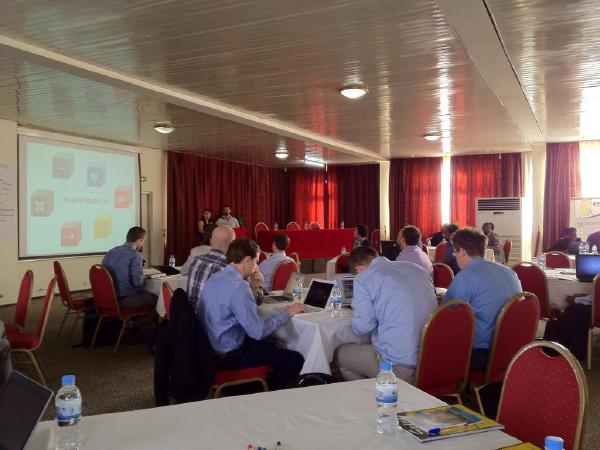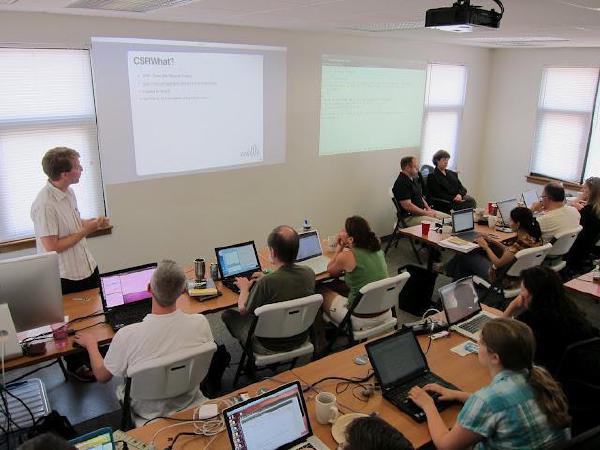Caktus Blog
2012

Caktus is hiring a Web Project Manager
Caktus is currently hiring for a full time Web Project Manager to be a part of our awesome team. We’re a diverse team of smart, sharp developers and designers with a passion for creating customizable, content rich sites and web applications using Django. As one of the project managers at Caktus, you’ll have the opportunity to develop your professional skills and also get the chance to work with some very capable and nice people.

Thoughts after attending the UNICEF Rwanda mHealth Conference
This past July, I had the pleasure of attending the UNICEF Rwanda Conference in Kigali, Rwanda. The conferences focus was on developing a comprehensive eHealth suite for numerous nations to implement.

Caktus is Sponsoring PyOhio 2012
Caktus is proud to announce that we are a sponsor of this year’s PyOhio conference taking place in Columbus, Ohio on July 28th and 29th! This is the 5th year for this regional conference and each year it continues to grow in size and scope. A great perk about PyOhio is that all of the talks are released for free online and also there is no charge to attend the conference. It is great to see more regional Python conferences throughout the nation and we are very excited to be a part of this growing trend. I will be attending the conference on behalf of Caktus, so make sure to seek me out and say hi, I will be wearing a Caktus t-shirt and would love to speak with you about what we do and of course any neat projects you’re building or working on in Python!

Django Training
Caktus is proud to announce that we are now offering Django training services. This new service includes both off and on-site training for you and your team to become a Djangonaut.

Django Fundamentals Bootcamp Recap
On June 8th and 9th, Caktus hosted its first Django Fundamentals Bootcamp. The Caktus team developed the idea for the course, which was a crossword drill application, and has been developing the structure and content of the course over the past year. The bootcamp was designed to teach programmers who have experience in programming with different languages and introduce them to the fundamentals of building a web application with Django. We created an interactive environment where the instructors and students were able to communicate with one another which solved the issue of how to begin developing in an unfamiliar language.

Karen Tracey to Deliver Keynote at DjangoCon Europe 2012
I am very proud to announce that Karen Tracey, Lead Developer at Caktus and Django Core Developer, will be delivering a keynote address at DjangoCon Europe next week. This will be Karen's first speech to the Django community, of which she has been an exemplary member since 2006.

Narrowing the Gender Gap in the Open Source community
Diversity is important in a workplace environment. Having different points of view from people with different life experiences brings creative new ideas and innovative solutions to the software development process. As a team of web developers that designs and builds custom web applications, creativity and gender diversity, I would argue, are closely tied and both crucial to the success of our projects.

Caktus is Sponsoring SwitchPoint 2012
I’m excited to announce that Caktus is a sponsor of the first SwitchPoint 2012 conference that is being held in the Saxapahaw Ballroom in Saxapahaw, NC. It is being organized by IntraHealth, an organization that mobilizes local talent for sustainable and accessible health care around the world. The conference is bringing together a number of people from different industries and disciplines to discuss how technology and ideas can increase global health equity. There are quite a few great speakers from RedHat, USAID, WorldBank and the United Nations. The Caktus team is really excited to attend Switchpoint and sponsor this incredible event.

Project Mwana in MobileActive
This past week, Project Mwana was a featured article on the site MobileActive. Project Mwana is a RapidSMS application that connects rural health clinic workers in Zambia and Malawi to HIV testing centers, increasing the collection and turn around time for results to over 50%. Tobias worked with the UNICEF Innovation team on the ground in Zambia and Malawi to assist with the systems architecture and training local developers to maintain the system. The RapidSMS platform allows the application to be easily scalable at a very affordable cost, making it one of the most efficient ways to connect people and send data between people. By the end of 2012, the goal is to have 250 clinics in Malawi using Project Mwana and complete coverage in Zambia by three years.

Caktus' Django Fundamentals Bootcamp
I’m excited to announce that on June 9th and 10th, Caktus will be hosting our first Django bootcamp. It will be a two day intensive bootcamp session where you’ll learn the basics of developing a web application using Django through constructing a crossword drill application, created by the Caktus staff. It will go over the architecture of Django and also different third party applications that will allow you to enhance the finished product. For more information regarding our bootcamp, you can check out the schedule of the day’s events.